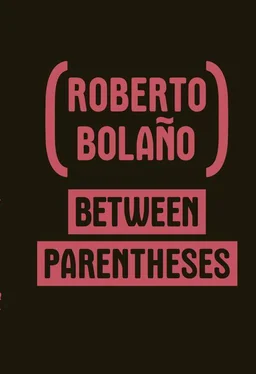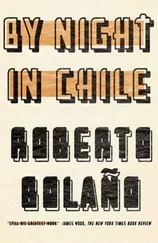Roberto Bolaño - Between Parentheses - Essays, Articles and Speeches, 1998-2003
Здесь есть возможность читать онлайн «Roberto Bolaño - Between Parentheses - Essays, Articles and Speeches, 1998-2003» весь текст электронной книги совершенно бесплатно (целиком полную версию без сокращений). В некоторых случаях можно слушать аудио, скачать через торрент в формате fb2 и присутствует краткое содержание. Год выпуска: 2011, Издательство: New Directions, Жанр: Публицистика, Критика, на английском языке. Описание произведения, (предисловие) а так же отзывы посетителей доступны на портале библиотеки ЛибКат.
- Название:Between Parentheses: Essays, Articles and Speeches, 1998-2003
- Автор:
- Издательство:New Directions
- Жанр:
- Год:2011
- ISBN:нет данных
- Рейтинг книги:4 / 5. Голосов: 1
-
Избранное:Добавить в избранное
- Отзывы:
-
Ваша оценка:
- 80
- 1
- 2
- 3
- 4
- 5
Between Parentheses: Essays, Articles and Speeches, 1998-2003: краткое содержание, описание и аннотация
Предлагаем к чтению аннотацию, описание, краткое содержание или предисловие (зависит от того, что написал сам автор книги «Between Parentheses: Essays, Articles and Speeches, 1998-2003»). Если вы не нашли необходимую информацию о книге — напишите в комментариях, мы постараемся отыскать её.
The Savage Detectives
Between Parenthese
Between Parentheses: Essays, Articles and Speeches, 1998-2003 — читать онлайн бесплатно полную книгу (весь текст) целиком
Ниже представлен текст книги, разбитый по страницам. Система сохранения места последней прочитанной страницы, позволяет с удобством читать онлайн бесплатно книгу «Between Parentheses: Essays, Articles and Speeches, 1998-2003», без необходимости каждый раз заново искать на чём Вы остановились. Поставьте закладку, и сможете в любой момент перейти на страницу, на которой закончили чтение.
Интервал:
Закладка:
Sometimes I get the feeling that September 11 wants to break us. Sometimes I get the feeling that September 11 has already irrevocably broken us.
What would have happened if September 11 had never existed? It’s a silly question, but sometimes it’s necessary to ask silly questions, or it’s inevitable, or it suits our natural laziness. What would have happened? Many things, of course. The history of Latin America would be different. But on a basic level, I think everything would be the same, in Chile and in Latin America. It can be argued: there would be no disappeared. True. And there would be no caravan of death. Or firing squads. In Mexico, I met a Mirista who was tortured by having rats put into her vagina. She was a young girl, just a little older than me, which means she must have been twenty-two or twenty-three, and later I was told that she died of sadness, like in a nineteenth-century novel. Without September 11, that wouldn’t have happened. What would we have seen? A different kind of repression, maybe. Instead of meeting that Mirista in Mexico, maybe I would’ve met her at a concentration camp in the south of Chile, where she was sent for her leftist views, that “childhood malady” (for childhood , read childish), and I was sent for being a writer with no class consciousness or sense of history. Would that have been better? I think so. Such a bath of horror, you might say, would be less sticky than the real historic bath of horror into which we were plunged.
A little while ago I was in Chile, where I happened to watch two or three televised conversations among politicians of different views. The conversations, if they can be called that (they were more like mini-debates, though more because of the atmosphere of conflict and strife than because of any controversy aired), consisted of a public exhibition of patience by the politicians of the center and the left, and a display of rudeness — when not of jingoistic hysteria — by the politicians on the right. I was left with the impression (possibly illusory) that some (precisely those supported by the majority of the electorate) took the position of recently liberated offenders still subject to the will (more imaginary than real) of their ex-jailers, and the others (those supported by a much smaller portion of the electorate) took a proud stance, the stance of gentlemen wounded to the quick, but also of badly behaved children, of bullies who don’t intend to concede a single point to their adversaries, completely forgetting that politics is above all the art of dialogue and tolerance.
And it’s here that the word abject turns up again. A difficult and cumbersome abjection that at times seems unshakable. It’s true that the left committed an infinity of crimes, by commission or omission. To require of the Chilean politicians on the left (who I suspect have committed very few crimes of commission) that they intone a permanent mea culpa for the Stalinist concentration camps is from any point of view an excessive demand. It’s toward this, however, that political discourse seems to tend. Toward an incessant penitence that takes the place of the exchange or expression of ideas. But this penitence isn’t even penitence. Its real purpose is to cover up one of the nation’s essential qualities: its ridiculousness and tweeness, the horrific seriousness of Chileans dressed up in the trappings of the twee, of that precious, pretentious vulgarity.
Sometimes, when I’m in the mood to think pointless thoughts, I ask myself whether we were always like this. I don’t know. The left committed verbal crimes in Chile (a specialty of the Latin American left), it committed moral crimes, and it probably killed people. But it didn’t put live rats in any girl’s vagina. It didn’t have the time to create its own evil, it didn’t have the time to create its own forced labor camps. Is it possible that it would have, if given the time? Of course it’s possible. Nothing in our country’s history allows us to imagine a more optimistic alternate history. But the truth is that in Chile the concentration camps weren’t the work of the left, and neither were the firing squads, torture, the disappeared, repression. All of this was accomplished by the right. All of this was the work of the government that took power after the coup. Nevertheless, as we enter the third millennium the politicians of the left are still asking to be forgiven, which after all isn’t so bad, and, upon reflection, is even advisable, on the condition that all politicians — those on the left and those on the right and those in the center — ask for forgiveness for all the real crimes that their fathers and grandfathers committed here and in other countries (especially in other countries!), and that they also ask forgiveness for the string of lies that their fathers and grandfathers told and that they themselves are prepared to keep telling, and for the secrets and the back-stabbing, and then wouldn’t that be a pretty picture, as Hart Crane says, all the country’s politicians asking to be forgiven, and even competing to see who can ask most convincingly or most loudly.
Of course, I would rather that we entered the twenty-first century (which incidentally means nothing) in a more civilized fashion, perhaps engaged in conversation, which also means listening and reflecting, but if, as everything seems to indicate, that won’t be possible, then it wouldn’t be a bad thing, or at least not the worst thing, to enter the third millennium asking for forgiveness right and left, and in the meantime, while we’re at it, we should raise a statue of Nicanor Parra in Plaza Italia, a statue of Nicanor and another of Neruda, but with their backs turned to each other.
At this point, I foresee that more than one alleged reader will say to himself (and then run to tell his friends and relatives): Bolaño says Parra is the poet of the right and Neruda is the poet of the left.
Some people don’t know how to read.
Out in the Cold
Long ago, when I was young, a friend showed me an anthology of contemporary poetry in Spanish, one of the many lackluster volumes that appear each year. This one had been published in Chile, and the contribution of one of the editors, a poet of certain standing, was to insist that at least half of the anthology be devoted to Chilean poetry. In other words, if the anthology was three hundred pages long, thirty pages were devoted to Spanish poetry, twenty to Argentine poetry, twenty to Mexican poetry, five to Uruguayan poetry, five to Nicaraguan poetry, maybe ten to Peruvian poetry (and Martín Adan wasn’t included), three to Colombian poetry, one to Ecuadorian poetry, and so on until one hundred and fifty pages were filled. Across the other hundred and fifty pages Chilean poets strolled at their leisure. This anthology, the title and editors of which I prefer not to recall, is a fair reflection of the image that Chilean poetry once had of itself. Poets were poor but they were poets. Poets lived off state patronage but they were poets. Until it all came to an end. Then the Chilean poets descended from the Chilean Olympus — which, incidentally, excepting the five greats (who might only be four, or possibly three), had little significance in other latitudes — in Indian file, reluctantly, bewildered and terrified, and they saw how their former home, the famous House of Handouts, had been taken over by an illustrious group of writers who called themselves novelists, noveltrixes, and even nouveau novelists. The recent arrivals, as one might expect, were quick to explain this change of tenancy with the magic word modernism or postmodernism . Novelists (in the absence of filmmakers) are modern and therefore they are the real mirror in which a modern society should examine itself. The poets, who, with a few exceptions, had until then carefully cultivated an apocalyptic aesthetic mixed with the crudest kind of nationalism, didn’t make a peep. They abandoned the field, surrendering to the evidence of sales figures. Chile is no longer a country of poets. Today there’s little chance that a couple of Chilean poets would think to put together an anthology of contemporary poetry in Spanish in which Chileans occupied more than half the pages. That supreme ignorance, that brutish provincialism, is today the exclusive heritage of the Chilean novel. The poets, those poor Chilean poets between the ages of thirty and fifty-five, today bow their heads and wonder what’s happened, why it’s suddenly started to rain, what are they doing out there in the cold, their minds blank, not sure which way to run. Anywhere else this would be a nightmare, but in Chile it’s a good thing. Literary status acquired by trickery and deceit was blown to pieces. Poetry’s respectability was reduced to a handful of dust. Now Chilean poets live out in the cold again. And they can go back to reading poetry. And they can even read or reread some Chilean poets. And they can see that what those poets wrote wasn’t bad, and that sometimes it was even good. And they can go back to writing poetry.
Читать дальшеИнтервал:
Закладка:
Похожие книги на «Between Parentheses: Essays, Articles and Speeches, 1998-2003»
Представляем Вашему вниманию похожие книги на «Between Parentheses: Essays, Articles and Speeches, 1998-2003» списком для выбора. Мы отобрали схожую по названию и смыслу литературу в надежде предоставить читателям больше вариантов отыскать новые, интересные, ещё непрочитанные произведения.
Обсуждение, отзывы о книге «Between Parentheses: Essays, Articles and Speeches, 1998-2003» и просто собственные мнения читателей. Оставьте ваши комментарии, напишите, что Вы думаете о произведении, его смысле или главных героях. Укажите что конкретно понравилось, а что нет, и почему Вы так считаете.












